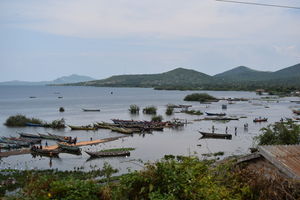Will DP Ruto's ‘Hustler’ spring survive?

Deputy President William Ruto addresses his supporters after the Hustlers' tournament finals at Mumboha Stadium in Luanda, Vihiga County, on October 10, 2020.
What you need to know:
- Criticised as politics of tokenism by his opponents, the wheelbarrow has become the symbol of the DP’s defiance. His boss Uhuru Kenyatta, meanwhile, keeps saying it’s not yet time to engage in open campaigns.
- The DP has styled his campaign as meant to uplift the masses from poverty and accuses the current regime, in which he serves, of being dynasty oriented.
Deputy President William Ruto hopes to replicate an ‘Arab Spring’ in the Kenyan political landscape through his Hustler Nation movement and ride it to power in 2022, his strategists say.
Criticised as politics of tokenism by his opponents, the wheelbarrow has become the symbol of the DP’s defiance. His boss Uhuru Kenyatta, meanwhile, keeps saying it’s not yet time to engage in open campaigns.
Dr Ruto’s choice of wheelbarrow,s salon kits, pushcarts and other hand tools as youth empowerment tools has been controversial. Government insiders are concerned that he is inciting the masses against Mr Kenyatta and his handshake partner Raila Odinga.
‘Arab Spring’ refers to a series of uprisings that swathed several Muslim countries, mostly in North Africa, from 2011 in response to oppressive regimes and low standards of living. It led to the toppling of regimes.
The DP has styled his campaign as meant to uplift the masses from poverty and accuses the current regime, in which he serves, of being dynasty oriented.
Tribalism
Prof Kithure Kindiki, the lawmaker from Tharaka Nithi, who recently lost his Senate deputy speaker’s position for associating with Dr Ruto, thinks the hustler-dynasty narrative introduces a semblance of ideology to our politics, which has always revolved around tribes.
“We would rather discuss the deep inequalities that define our ugly past and present, because we can do something about it, rather than dangerously dividing the country by tribe, an immutable characteristic which one has no control of,” he says.
Prof Kindiki points that this has been done before in other jurisdictions. “Economic class is a man-made situation which can be systematically addressed, as was done in the past through the French Revolution of 1789, the Russian Bolshevik Revolution of 1917 and the Maoist Revolution in China of 1945 to 1950.”
However, this class narrative requires intellectual refinement and packaging so that it is acceptable to majority of Kenyans and friends of Kenya as an alternative democratic discourse that can lift Africa’s curse of the tribe, the Senator says.
But some, like Minority Whip in the National Assembly Junet Mohamed, an Odinga ally, hold that it is not possible to successfully “incite” Kenyans to a revolution at the ballot as long as they vote as guided by their tribal gods.
“All of us poor men and women, hustlers like he (the DP) calls them, church-goers, bishops and imams, go back to our tribal cocoons when elections are called. That’s the sad fact. Our politics are ethnic based, especially in the presidential category,” he said.
Cotu Secretary-General Francis Atwoli, another supporter of Mr Odinga, is of the same view: “You cannot parade some lightweights like (Boni) Khalwale or (Kimani) Ichung’wa in the hope of swaying community support in your favour while isolating the kingpins. It is like going to Central and bypassing Uhuru, or Nyanza and bypassing Raila, or Coast and bypassing Joho. I thought Ruto has been in this game long enough to know this.”
"Fake storyline"
Like the politicians, pundits are divided on the viability of the ‘hustler spring’.
While some think it resonates well with the masses, others argue that the rope could snap in the last minute and voters retreat to their tribal cocoons.
History researcher and author Godfrey Sang feels that the 'hustler' movement would be sustained by the mere fact that 'hustlers' cut across the entire country and that tribal politics achieved nothing for the tribes that bore former heads of state.
“I think there is a consciousness about the stupidity of voting along tribal lines. It got us nothing. For instance, what do the Kikuyu have to show for having a Kikuyu president?,” Mr Sang told the Nation in a phone interview.
He added: “The youth make up 70 per cent of the nation. Ruto must not even look like a Kalenjin. He must emerge as a cosmopolitan candidate — tribeless and classless.”
But Nation columnist Gitau Warigi says the 'hustler' storyline is “as fake as it can be”.
“The problem in this country is not dynasties or self-styled 'hustlers' per se. It is corruption. That is what must be eradicated. Bogus tales of childhood deprivation are a distraction. In any case there is no special wisdom you acquire because of the circumstances of your birth.”






